Key takeaways:
- Regular maintenance, including oil changes and fluid checks, is essential for optimal engine performance and longevity.
- Inspecting the air filter can significantly improve fuel efficiency and overall driving experience.
- Monitoring fuel quality and performance helps prevent engine issues, ensuring smoother operation.
- Being attentive to unusual engine noises and dashboard warnings can facilitate early troubleshooting and avoid major problems.

Understanding Suzuki engine basics
When I first got my Suzuki, I was amazed by the simplicity and efficiency of its engine. Understanding the basic components, like the four-stroke cycle, helped me grasp how everything worked together. Have you ever taken a moment to appreciate how engine timing affects performance?
One of the key features of Suzuki engines is their design for reliability. I remember one summer road trip when my engine purred through the mountains, reminding me just how well these machines can handle stress. It’s all about ensuring proper maintenance – tuning and oil changes play a huge role.
Moreover, I find that the fuel system, especially the way Suzuki engines manage air and fuel mixture, is crucial for optimal performance. It’s fascinating to think how even a small clog can ripple into bigger issues. Sometimes, I wonder if others have experienced the satisfying feeling of a perfectly tuned engine; there’s nothing quite like it!
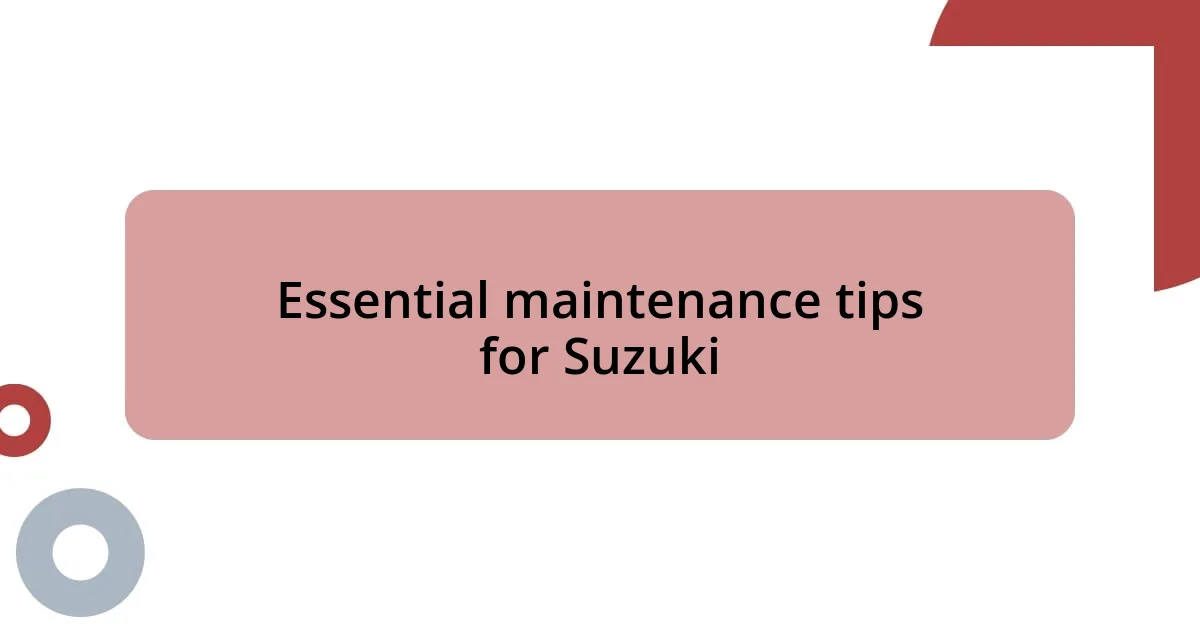
Essential maintenance tips for Suzuki
It’s crucial to stay on top of regular oil changes for my Suzuki. I recall the first time I switched to synthetic oil and how it transformed my engine’s performance. The smoothness was noticeably different, and it gave me peace of mind knowing that I was helping to extend the engine’s life.
Another essential tip is ensuring all fluid levels are checked regularly. I make it a habit to inspect my coolant, brake fluid, and transmission fluid periodically. One time, I noticed my brake fluid was low just before a long trip, and I was grateful I caught it in time. Little checks like this can save you from bigger problems down the road.
Lastly, keeping an eye on the air filter is often overlooked but incredibly important. I learned this the hard way when I neglected my filter, leading to a decrease in fuel efficiency. After a quick replacement, I was blown away by how much better my Suzuki performed. You really can’t underestimate how these small components contribute to the overall health of your engine.
| Maintenance Task | Recommended Frequency |
|---|---|
| Oil Change | Every 5,000-7,500 miles |
| Fluid Checks | Monthly |
| Air Filter Replacement | Every 15,000-30,000 miles |
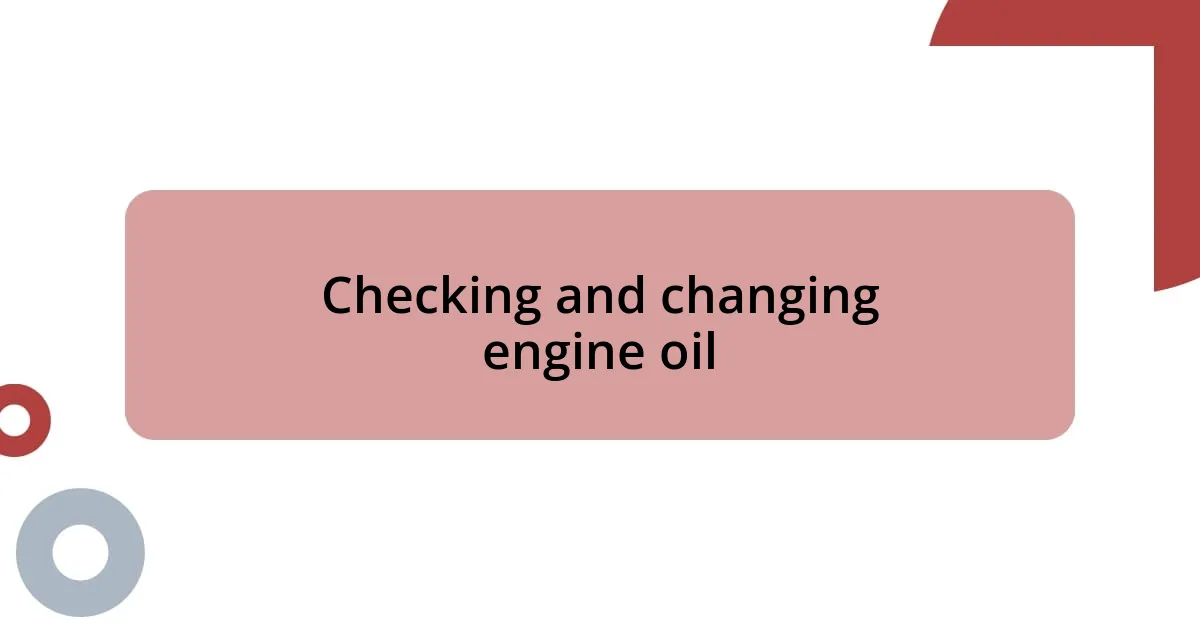
Checking and changing engine oil
When it comes to checking and changing engine oil, I make it a point to stay proactive. After all, I once let my oil change slip by, and the engine noise that followed was a wake-up call. It’s crucial to check the oil level regularly with the dipstick and look out for any unusual colors or particles, which can indicate a problem.
- Use the dipstick to check oil level: Make sure the engine is cool and parked on a level surface.
- Look for oil clarity: Healthy oil should be amber and translucent. If it’s dark or gritty, it’s time to change it.
- Change intervals: I typically aim for every 5,000 miles, or sooner if I notice those telltale signs.
Last summer, I discovered the joy of changing my oil myself. There’s something incredibly satisfying about it that I didn’t expect. With the right tools and a bit of preparation, the process felt empowering. The moment I poured in new, shiny oil, the engine felt revitalized – like I had breathed new life into a trusted companion. It’s those small routines, like oil changes, that remind me how connected I am to my Suzuki. They really matter for performance and longevity.
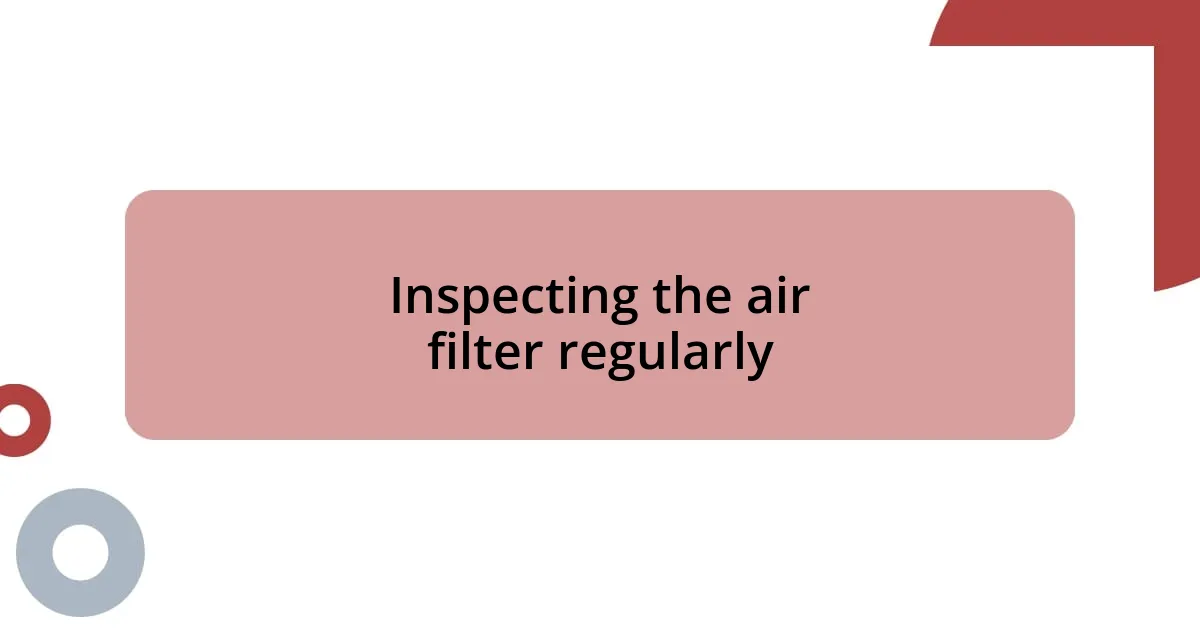
Inspecting the air filter regularly
Keeping my air filter in check has become a regular part of my Suzuki maintenance routine. Once, during a long road trip, I noticed my engine sputtering a bit. I pulled over and discovered that a clogged air filter was the culprit, suffocating my engine. Ever since then, I make it a point to inspect the air filter every few months. A clean air filter not only improves airflow but directly impacts performance and fuel efficiency.
It’s amazing how an often-neglected component like the air filter can transform my driving experience. There was a time when I ignored it for too long, feeling the vehicle’s lackluster response. After replacing the filter, it was as if my Suzuki had found a new lease on life. The acceleration felt crisper, and I couldn’t help but smile at the noticeable improvement. Have you checked your air filter lately? You might be surprised at how small changes can lead to big differences.
I’ve learned that the frequency for replacing my air filter can vary based on driving conditions. For instance, if you often drive in dusty areas, it’s wise to check it more frequently. I learned this firsthand during a camping trip when the filter became packed with dirt after a few rough, unpaved roads. Monitoring this simple element not only saves you future headaches but also ensures your engine runs as smoothly as possible. It’s a small investment of time for a significant payoff in performance and peace of mind.
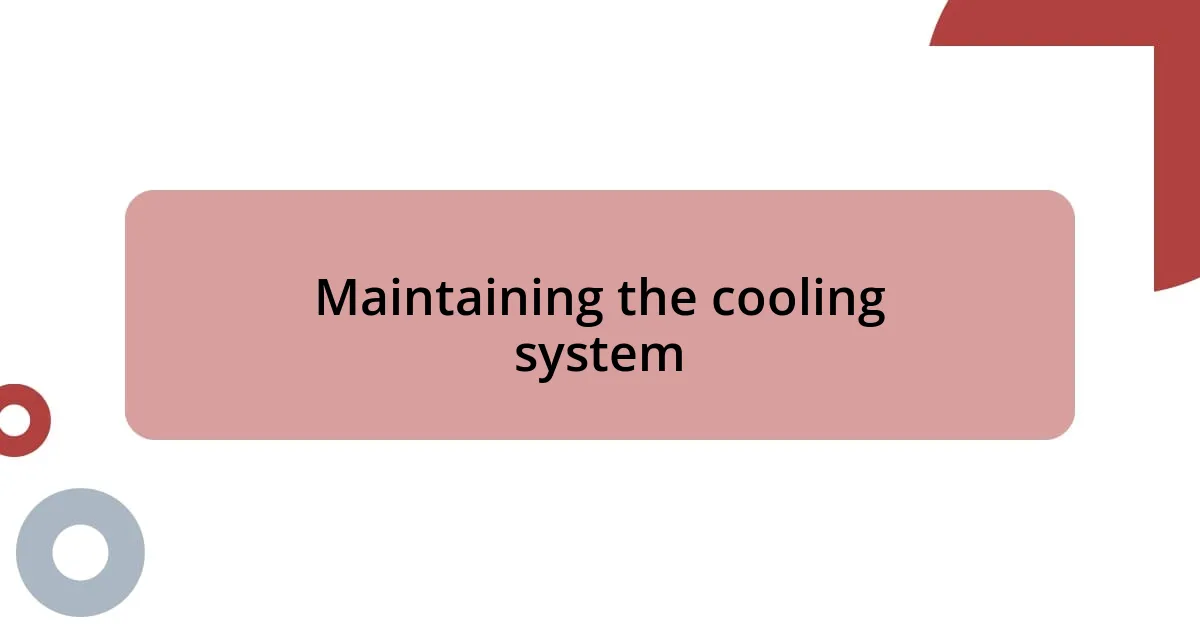
Maintaining the cooling system
Maintaining the cooling system in my Suzuki is something I don’t take lightly. I remember one scorching summer day when my temperature gauge began to creep into the red zone. It turned out that a simple coolant check could have spared me an unexpected trip to the mechanic. Now, I routinely inspect the coolant level and always ensure it’s topped off to the manufacturer’s specifications. A well-maintained cooling system helps prevent overheating and keeps my engine running smoothly.
I also make it a point to flush the coolant system every couple of years. I recall a time when I didn’t follow through with this, and I started noticing a rusty residue in the overflow tank. It was a stark reminder of how neglecting a small detail can lead to bigger issues down the line. Flushing the system not only removes built-up sediment but also helps ensure I have the right coolant mixture to combat both hot days and chilly nights. Have you ever been caught off-guard by engine heat? Keeping a sharp eye on the cooling system has taught me that prevention is always better than cure.
Lastly, I never ignore the condition of the radiator itself. There was a time when I wiped away leaves and debris from its exterior, only to be astounded by how much better my engine performed afterward. Cleaning the radiator grill regularly makes a significant difference in its ability to dissipate heat. I often wonder, how often do we overlook the simple maintenance tasks that can maximize our engines’ efficiency? Ensuring that my cooling system is in top shape not only gives me peace of mind but also reaffirms my bond with my trusty Suzuki.
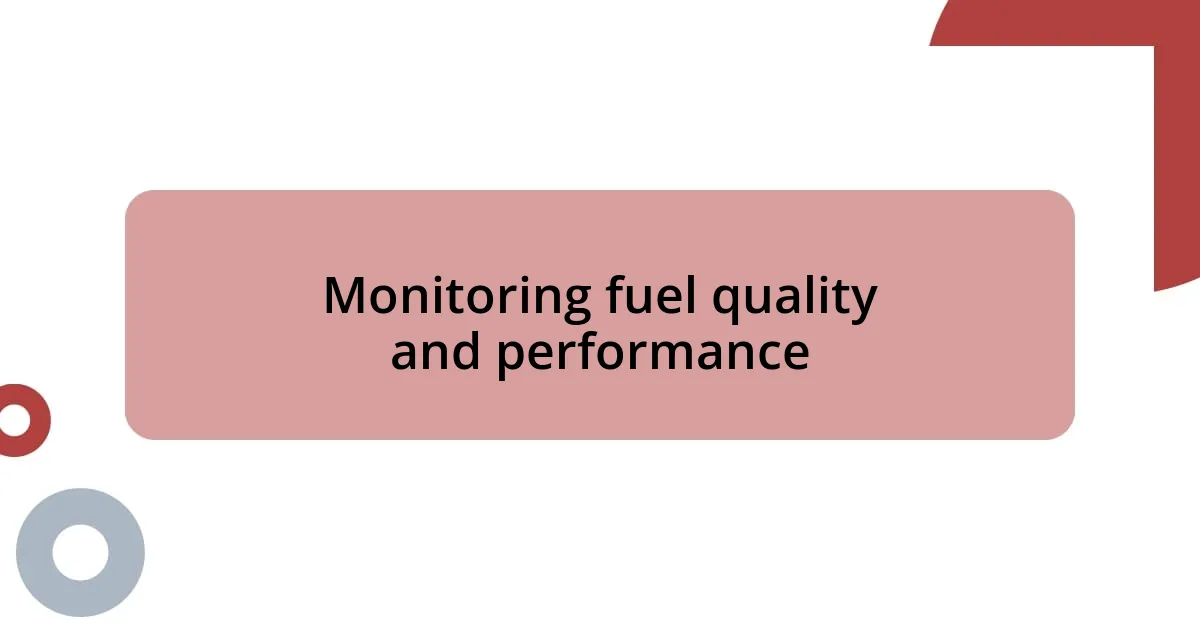
Monitoring fuel quality and performance
Monitoring fuel quality is a crucial step in my Suzuki maintenance routine. I distinctly remember a time when I filled up at a new station and my engine started to misfire shortly after. That experience taught me the hard way that not all fuel is created equal. Now, I’m pretty discerning about where I fill up, prioritizing well-known brands that guarantee higher-quality fuel. Do you ever think about what kind of fuel you’re putting in your vehicle?
I also keep an eye on my fuel’s performance by being attentive to any changes in how my Suzuki runs. If I notice decreased acceleration or a rough idle, it raises a red flag for me. I’ve found that tracking my fuel consumption and performance metrics helps me identify potential issues early on. Recently, I decided to record my fuel mileage after noticing my Suzuki seemed thirstier than usual. This data revealed that a simple fuel system cleaner helped restore my engine’s responsiveness, allowing it to breathe easier, and my driving experience improved in leaps and bounds.
Lastly, I cannot stress enough the importance of keeping my fuel system clean. I’ve had incidents where stale fuel caused my engine to hesitate, especially during the colder months. So, I make it a point to use fuel stabilizers when I know my Suzuki will be sitting for a while. Have you ever faced a sluggish start after letting your vehicle rest? Those little precautions ensure that my engine continues to perform optimally, and it’s empowering to feel in control of my Suzuki’s health.
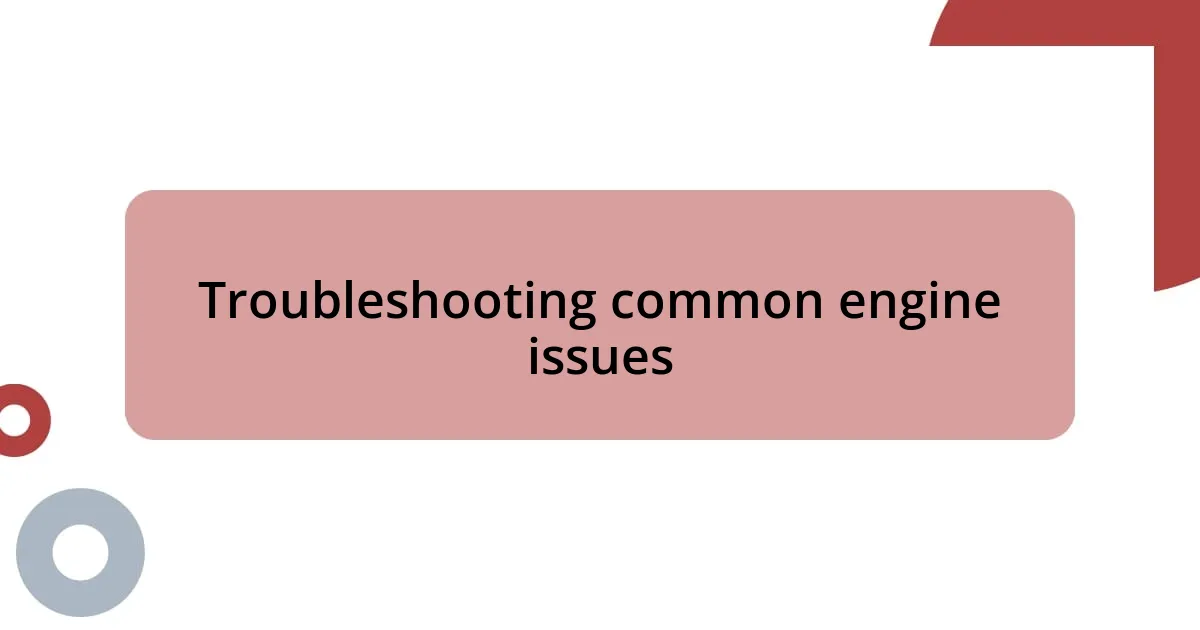
Troubleshooting common engine issues
There have been moments when my Suzuki engine has thrown me for a loop with mysterious noises. I’ll never forget when I heard a strange knocking sound that made my heart race. It turned out to be a simple loose bolt that needed tightening—something I could fix myself with just a wrench. This experience taught me the importance of listening to what my engine is telling me. Have you ever noticed an odd sound and ignored it? Trusting my instincts has always led me to solutions before they escalate into bigger problems.
Sometimes, I find myself battling with the engine light that unexpectedly flickers on. It feels like a game of chicken trying to determine whether it’s a simple issue, like a loose gas cap, or something more serious, like a sensor malfunction. I recall one instance where I played detective; after checking a few things, I realized it was just a minor issue with my air filter. I was relieved to resolve it without a trip to the mechanic. Have you ever felt the dread of that engine light? I’ve learned to keep a personal checklist of what to inspect when that light comes on—it helps me stay ahead of potential problems.
Fuel efficiency issues can also pop up unexpectedly, prompting me to take a closer look at the spark plugs. I remember the first time my gas mileage took a hit, and I couldn’t figure out why. Upon inspecting the plugs, I discovered they were worn out and needed replacing. Once I swapped them out, my Suzuki felt revitalized, and my fuel economy improved significantly. It’s amazing how such a small component can make such a big difference, right? Staying proactive about these details allows me to maintain my engine’s health more effectively, and it’s always satisfying to get to the root of an issue.














